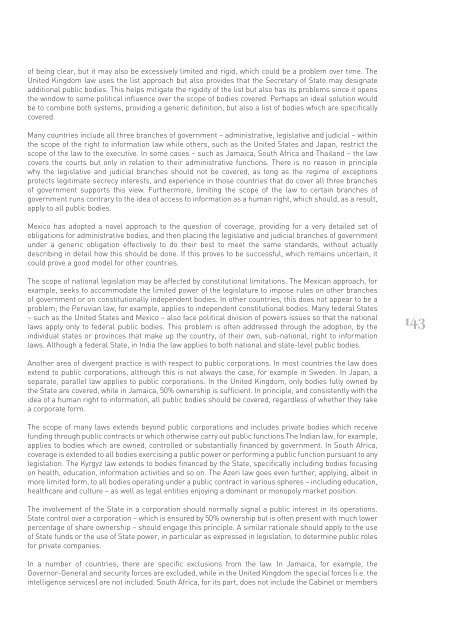Freedom of Information: A Comparative Legal Survey - Federation of ...
Freedom of Information: A Comparative Legal Survey - Federation of ...
Freedom of Information: A Comparative Legal Survey - Federation of ...
You also want an ePaper? Increase the reach of your titles
YUMPU automatically turns print PDFs into web optimized ePapers that Google loves.
<strong>of</strong> being clear, but it may also be excessively limited and rigid, which could be a problem over time. The<br />
United Kingdom law uses the list approach but also provides that the Secretary <strong>of</strong> State may designate<br />
additional public bodies. This helps mitigate the rigidity <strong>of</strong> the list but also has its problems since it opens<br />
the window to some political infl uence over the scope <strong>of</strong> bodies covered. Perhaps an ideal solution would<br />
be to combine both systems, providing a generic defi nition, but also a list <strong>of</strong> bodies which are specifi cally<br />
covered.<br />
Many countries include all three branches <strong>of</strong> government – administrative, legislative and judicial – within<br />
the scope <strong>of</strong> the right to information law while others, such as the United States and Japan, restrict the<br />
scope <strong>of</strong> the law to the executive. In some cases – such as Jamaica, South Africa and Thailand – the law<br />
covers the courts but only in relation to their administrative functions. There is no reason in principle<br />
why the legislative and judicial branches should not be covered, as long as the regime <strong>of</strong> exceptions<br />
protects legitimate secrecy interests, and experience in those countries that do cover all three branches<br />
<strong>of</strong> government supports this view. Furthermore, limiting the scope <strong>of</strong> the law to certain branches <strong>of</strong><br />
government runs contrary to the idea <strong>of</strong> access to information as a human right, which should, as a result,<br />
apply to all public bodies.<br />
Mexico has adopted a novel approach to the question <strong>of</strong> coverage, providing for a very detailed set <strong>of</strong><br />
obligations for administrative bodies, and then placing the legislative and judicial branches <strong>of</strong> government<br />
under a generic obligation effectively to do their best to meet the same standards, without actually<br />
describing in detail how this should be done. If this proves to be successful, which remains uncertain, it<br />
could prove a good model for other countries.<br />
The scope <strong>of</strong> national legislation may be affected by constitutional limitations. The Mexican approach, for<br />
example, seeks to accommodate the limited power <strong>of</strong> the legislature to impose rules on other branches<br />
<strong>of</strong> government or on constitutionally independent bodies. In other countries, this does not appear to be a<br />
problem; the Peruvian law, for example, applies to independent constitutional bodies. Many federal States<br />
– such as the United States and Mexico – also face political division <strong>of</strong> powers issues so that the national<br />
laws apply only to federal public bodies. This problem is <strong>of</strong>ten addressed through the adoption, by the<br />
individual states or provinces that make up the country, <strong>of</strong> their own, sub-national, right to information<br />
laws. Although a federal State, in India the law applies to both national and state-level public bodies.<br />
Another area <strong>of</strong> divergent practice is with respect to public corporations. In most countries the law does<br />
extend to public corporations, although this is not always the case, for example in Sweden. In Japan, a<br />
separate, parallel law applies to public corporations. In the United Kingdom, only bodies fully owned by<br />
the State are covered, while in Jamaica, 50% ownership is suffi cient. In principle, and consistently with the<br />
idea <strong>of</strong> a human right to information, all public bodies should be covered, regardless <strong>of</strong> whether they take<br />
a corporate form.<br />
The scope <strong>of</strong> many laws extends beyond public corporations and includes private bodies which receive<br />
funding through public contracts or which otherwise carry out public functions The Indian law, for example,<br />
applies to bodies which are owned, controlled or substantially fi nanced by government. In South Africa,<br />
coverage is extended to all bodies exercising a public power or performing a public function pursuant to any<br />
legislation. The Kyrgyz law extends to bodies fi nanced by the State, specifi cally including bodies focusing<br />
on health, education, information activities and so on. The Azeri law goes even further, applying, albeit in<br />
more limited form, to all bodies operating under a public contract in various spheres – including education,<br />
healthcare and culture – as well as legal entities enjoying a dominant or monopoly market position.<br />
The involvement <strong>of</strong> the State in a corporation should normally signal a public interest in its operations.<br />
State control over a corporation – which is ensured by 50% ownership but is <strong>of</strong>ten present with much lower<br />
percentage <strong>of</strong> share ownership – should engage this principle. A similar rationale should apply to the use<br />
<strong>of</strong> State funds or the use <strong>of</strong> State power, in particular as expressed in legislation, to determine public roles<br />
for private companies.<br />
In a number <strong>of</strong> countries, there are specifi c exclusions from the law. In Jamaica, for example, the<br />
Governor-General and security forces are excluded, while in the United Kingdom the special forces (i.e. the<br />
intelligence services) are not included. South Africa, for its part, does not include the Cabinet or members<br />
143
















